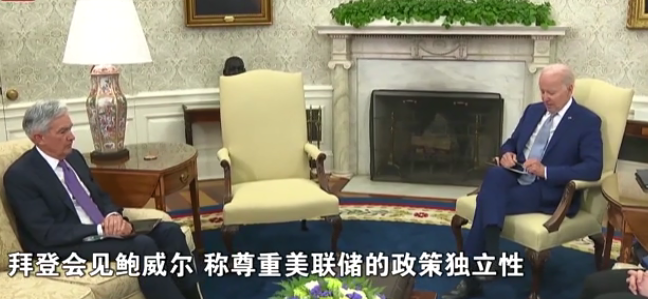Big burst table: Biden meets with the chairman of the Federal Reserve and the US Treasury secretary to discuss inflation together! !
On May 31, local time, the White House issued a statement saying that US President Biden met with Federal Reserve Chairman Powell and Treasury Secretary Yellen on the same day to discuss inflation.
In remarks ahead of the talks, Biden said tackling inflation was his top priority. He also pointed to the Fed's dual mandate, including full employment and stable prices, and he looked to Powell to continue his leadership in tackling inflation.
Yellen speaks out
Admits last year's misjudgment of inflation trends
After the meeting, U.S. Treasury Secretary Janet Yellen said inflation was President Biden's greatest concern. Biden agrees that the Fed has made containing inflation a top priority. The Fed is taking the necessary steps. The fall in core inflation is encouraging, but oil prices remain high.
Yellen also warned that further inflationary shocks cannot be ruled out.
Yellen also noted that job growth is not expected to move forward at the same pace. During the transition period, hope to maintain employment growth.
Yellen also admitted to miscalculating inflation. According to CCTV, on May 31, local time, Yellen admitted after the meeting that she made a wrong judgment in predicting that rising inflation in 2021 would not constitute continued trouble.
Yellen said she was wrong about where inflation was going, didn't fully understand what was going on at the time, and there were some unanticipated shocks that made things worse.

Biden meets Powell, says he respects Fed's policy independence
Investors were widely focused on Tuesday when U.S. President Joe Biden met with Federal Reserve Chairman Jerome Powell at the White House. After the meeting, Biden said that the Fed will use its policy tools to deal with rising prices. He also reiterated his respect for the independence of the Fed, saying that he would not interfere in the work of the Fed. In the eyes of investors, the statements suggest that Biden will support the Fed to raise interest rates by 50 basis points in June and July.
On Tuesday, local time, global financial markets refocused on inflationary pressures. The inflation rate in the euro zone hit a record high again in May, and Federal Reserve Governor Waller expressed his support for continuing to raise interest rates to a neutral interest rate level within this year, reviving investors' concerns about aggressive interest rate hikes by major central banks around the world and the economy falling into recession, and market risk appetite cooled. , the three major U.S. stock indexes closed down collectively for the first time in the last 4 trading days. As of the close, the Dow fell 0.67%, the S&P 500 fell 0.63%, and the Nasdaq fell 0.41%. Among the 11 major sectors of the S&P 500, only two of the consumer discretionary and communication services closed slightly higher, and the rest all fell.
The three major U.S. stock indexes have been mixed in May and the Nasdaq has fallen more than 2%
U.S. stocks ended a volatile May as stocks closed on Tuesday. Throughout May, the Dow and S&P 500 barely maintained their gains, avoiding a two-month losing streak; the Nasdaq failed to avoid this, falling 2.05% for the month.
The three major European stock markets were mixed on May 31
In Europe, the latest data on Tuesday showed that inflation in the euro zone reached an annual rate of 8.1% in May, a record high. The market expects that the European Central Bank may take a gradual path of raising interest rates in small steps, or raise interest rates for the first time in more than a decade from July, with a single rate hike of 25 basis points. Affected by this expectation, the French and German stock markets in the three major European stock markets fell significantly. As of the close, the British stock market rose 0.1%, the French stock market fell 1.43%, and the German stock market fell 1.29%.
New York oil prices turn lower on May 31
In the crude oil market, international oil prices rose to a nearly 3-month high in midday trading on Tuesday as the EU's extraordinary summit reached an agreement on a partial ban on imports of Russian oil. However, as Western countries continue to impose sanctions on Russia's oil industry, Russia's oil production capacity may gradually decline. OPEC producers are reportedly considering waiving Russia from a joint production target, a move that could pave the way for major producers such as Saudi Arabia to further expand output, reports said. Affected by this news, international oil prices fell in intraday trading. At the close, Brent oil prices narrowed and New York oil prices fell. As of the close, the price of light sweet crude oil futures for July delivery on the New York Mercantile Exchange closed at $114.67 per barrel, a decrease of 0.35%; the price of London Brent crude oil futures for July delivery closed at $122.84 per barrel, an increase of 0.96%.
Previous:Just now, The global container ship order exceeded 900 and reached 901!
Next:European ports are seriously congested, and a large number of containers are piled up!